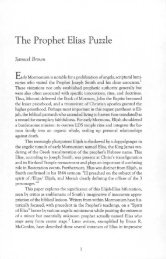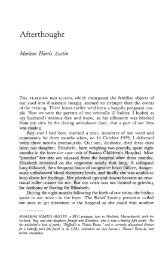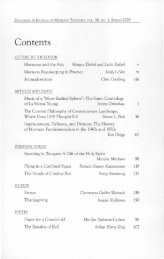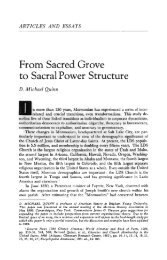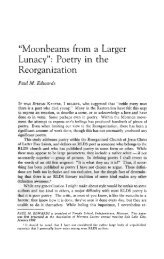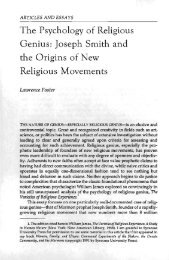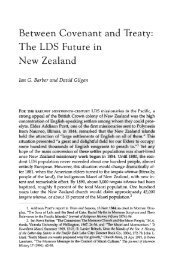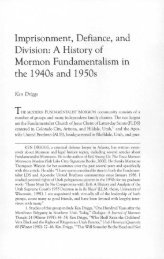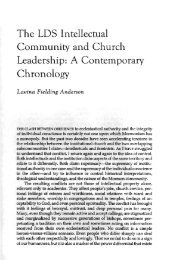Dialogue, Volume 25, Number 2 - Dialogue – A Journal of Mormon ...
Dialogue, Volume 25, Number 2 - Dialogue – A Journal of Mormon ...
Dialogue, Volume 25, Number 2 - Dialogue – A Journal of Mormon ...
Create successful ePaper yourself
Turn your PDF publications into a flip-book with our unique Google optimized e-Paper software.
Lindquist: The Bambara Mirror 57<br />
ately to make democracy a reality.) Ninety-five percent <strong>of</strong> the women<br />
are illiterate, unrecorded numbers die daily <strong>of</strong> traumatic childbirth,<br />
and the infant mortality rate is the highest in the world (Population<br />
Reference Bureau 1989).<br />
We saw, then, a people and land opposite from our suburban life<br />
glutted with brick and glass homes, multiple vehicles, sprinkling systems,<br />
hospitals, schools, dance lessons, contraceptives, and eye-glasses.<br />
Major distinctions seemed clear: They spoke colloquial Bambara and,<br />
if educated, French, a hold-over from colonial days; we spoke English.<br />
They were impoverished; we were wealthy. They polygamous, we monogamous.<br />
They politically oppressed, we free to vote for laws and people<br />
to represent us. They were Muslim, we Christian. Finally, obviously,<br />
they, the Bambara, were needy, we <strong>Mormon</strong>s appeared need-fulfilling.<br />
Our group arrived at the village <strong>of</strong> N'Tintoukoro and jumped from<br />
the back <strong>of</strong> our pickup truck, anxious to meet the people and address<br />
those needs. Our job was to help build the first village chain link fence<br />
in Ouelessebougou, its purpose to prevent animals from grazing on<br />
vegetables the people needed year-round. A throng <strong>of</strong> women, children,<br />
and men surrounded us, all shouting / ka kene ("greeting") and<br />
extending calloused hands to shake. As our chairman and Malian<br />
interpreter busied themselves with the men, we women pretend-worked,<br />
danced, joked, and spoke with the village women. The old women<br />
laughed delightedly at our ineptness with their musical instruments;<br />
they gently poked and patted us and teased us for mispronouncing<br />
their names while indicating that our names were too strange to repeat.<br />
The young women smiled shyly, some handing us their bare-bottomed<br />
babies to hold and admire.<br />
Each village, like N'Tintoukoro, greeted us ceremoniously. Men<br />
led us to seats <strong>of</strong> honor under a shady tree where they and the older<br />
boys sat, grouped age-ascending, around us. Females and infants<br />
formed a separate circle or worked at household chores outside the<br />
gathering. First the community leaders —the chief, patriarch, and<br />
priest —welcomed us with speeches and gifts <strong>of</strong> peanuts and live blackand-white-speckled<br />
chickens inert from hanging upside-down. Then<br />
our chairman accepted the gifts and replied: "We are happy and grateful<br />
to be here with you. We come from a country and a city where<br />
there is a lot <strong>of</strong> money. But there isn't the happiness and the caring for<br />
each other, and the feeling <strong>of</strong> unity that we feel here."<br />
Although I was uncomfortable, even angry, that our representative<br />
had clearly designated our culture as generally rich, uncaring, and<br />
unhappy, I understood his observations about Bambara connectedness.<br />
Each time we traveled from one village to another to visit a garden,<br />
or when we strolled among the huts, shaking hands and scaring








